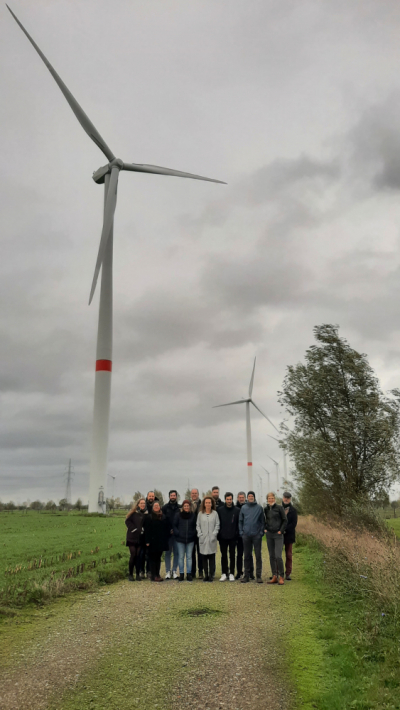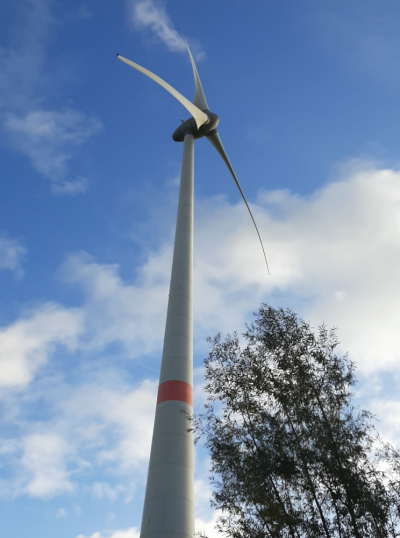Original article in Flemish on ‘Gemeente voor de Toekomst, een project van Bond Beter Leefmilieu.’ (‘Municipality for the future, a project by Bond Beter Leefmilieu’)
Giving families in vulnerable situations life-long access to green and affordable energy: that is the ambition of the POWER UP pilot activities in Eeklo in East Flanders. Fien Vanderbeke (working for the City of Eeklo) and Jan De Pauw (employee at Ecopower) explain how they put this innovative and simple idea into practice – and how other municipalities should soon be able to follow their steps. “If local governments use their democratic power, endless possibilities are possible.”
In 2022 we saw it again: the federal Belgian government handed out one-off heating premiums to reduce people’s sky-high energy bills. “However, such premiums are like a plaster on a wooden leg,” says Jan De Pauw of energy cooperative Ecopower. “People are only helped temporarily with such a check and they still pay the invoice back themselves at the end of the journey. Invest that premium in a local energy cooperative and you get a completely different story.”
With the POWER UP project, Eeklo and Ecopower put it to the test by releasing green electricity for the most vulnerable families. Tell us more about it!
Jan De Pauw: Eeklo has been building wind turbines on its territory for years and makes the produced wind energy available to citizen cooperatives such as Ecopower and Volterra. This decision gives Eeklo residents the opportunity to opt for local and green citizen energy, but also and above all to get a grip on their energy bill again. A household that purchased citizen power in the crisis year of 2022 has an average energy bill that is 800 euros lower than if he’d been with a commercial supplier. The only condition is to pay an entry fee of 250 euros to become a member of a citizen cooperative with local energy projects.
Fien Vanderbeke: However, we discovered that the entry fee for vulnerable families is barely affordable. That got us thinking. After all, it cannot be that people who need it most for a model that structurally reduces the energy bill find it difficult to access it? And so the idea of POWER UP was born. As a city, we are now freeing up a budget to pre-finance that entry amount for the families most in need. Through a pilot project, we want to have 20 families join before the summer, and then we will systematically expand to 100.
A structural solution for energy poverty
Why would the City of Eeklo do such an investment?
Fien: POWER UP is a huge opportunity to tackle energy poverty in a sustainable and structural way. We make local renewable energy accessible and affordable to those who need it most. And that with a one-off investment that pays for itself. Here is the deal: for five years, those families pay that loan amount back through their savings on the energy bill. After that period of time they officially become owners in the cooperative while the city administration can then invest the refunded entry amount in new underprivileged families.
In addition, we also notice that we are creating more and more support for local wind energy and connecting with our residents thanks to this cooperative approach. It is therefore our chance to directly involve the most vulnerable people in the local energy transition.

A customized offer
Coming up with such a beautiful concept is one thing, putting it into practice is another. How do you ensure that the most vulnerable families will effectively take up your offer?
Jan: Thanks to the support of the European POWER UP project, we have been given time and manpower to put this idea into practice. You need to know that there are actually some thresholds: For the moment, people with debts to the emergency supplier Fluvius cannot just switch supplier. Even worse: they pay an expensive energy rate. It is also anything but self-evident to convince this target group to take out another ‘loan’. So over the past year we have been busy figuring this out financially, legally and practically. So that we can soon go to the people with a proposal that they (hopefully) can’t say no to.
Fien: Over the past few months, we talked to vulnerable residents in Eeklo during various workshops: We explained what exactly is POWER UP and what their participation would mean for their energy bill? How can we make the administrative steps as simple as possible? And why should or shouldn’t someone sign this agreement to join? Those conversations were crucial to make our proposal realistic.
How did this help you to come up with a convincing business model and offer?
Fien: We learned a number of important things for our communication. For example, we try not to use the word ‘loan’ anymore, because people associate it with building up debt. We are also very transparent and clear about everything. Take, for example, the principle that you get your money back when you sell your share. Initially this was not clear to everyone and caused uncertainty about the concept. We also understood that we must make the savings they can realize thanks to our proposal very concrete. These face-to-face conversations are crucial in explaining the concept and resolving concerns.
It’s a blueprint.
You are also currently working on a blueprint for local governments. What exactly does this mean?
Jan: We are paving the way for municipalities that want to get started soon with this idea. We will share our experience and provide the necessary documents. Think of a unique support model for the use of renewable energy sources with citizen participation, a model contract and a lot of tips for approaching the target group. Of course, each project will have its own accents, but there will be a lot on the table that municipalities can start from.

A need for better regulation
What else do municipalities need besides that content and documents to successfully implement POWER UP?
Fien: Within the city there must be a clear vision and belief in the social project, and the participation in renewable energy projects that goes with it. That means providing time and manpower to listen to the people you are doing it for. Dare to start the conversation and propose new measures. Not by simply asking: ‘What do you think?’, but by critically examining together a specific policy proposal . You learn a lot from that.
Jan: The first step is to establish clear rules of the game. Look where there is room for wind and solar energy in your place and draw up regulations that make room for direct citizen participation. This is the only way to make initiatives such as POWER UP possible. The good news is: you don’t have to invent hot water for that. The practices are already there. There are now several active citizens’ cooperatives in every municipality that are asking for concrete projects. So I always say to municipalities: dare to use your democratic leverage and then an infinite number of possibilities are possible.
More info:
